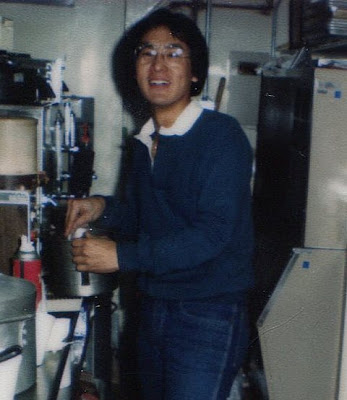Asian carp are a non-native invasive species. That is, they aren't native to the area and, as such, have no natural predators, which allows them to multiply unchecked. They are another example of the unforeseen consequences of humans messing with the so called balance of nature (see my post "Putting the Revolution n Revolution Foods" for the most famous example of this).
The carp were imported from Asia in the 1970's to cleanse fish ponds and sewage lagoons in the Deep South.; They eat algae and; In the 1990's a series of floods allowed the carp to escape into the
These fish can be up to 4 feet long and weigh up to 100 pounds.
Because they have no natural predators, they multiply very rapidly. They may seem harmless because they only eat algae and plankton but each carp eats 40% of its body weight each day or 40 pounds of algae for each 100 pound carp. They eat so much that the other creatures that eat the same food starve to death. As they die, the predators which eat them starve as well. Some biologists fear that the carp will soon be the only fish living in the Mississippi.
If the carp do make their way into the Great Lakes, one of the many fish that will suffer from their presence is the Northern Pike.
The Northern Pike is regarded as one of the great game fishes of the U.S.. A game fish is a fish that is challenging for fishermen to catch. Northern Pike are mean, voracious predators with a mouthful of teeth. They will eat almost any other fish. Compared to Pike, the trout found in California lakes are considered to be tame.
Back in the 90's it is believed that a sport fisherman from the Great Lakes area decided to do something about this. Tired of catching small trout, he planted some Northern Pike into a beautiful Sierra lake named Lake Davis.
Lake Davis is famous for its trout fishing. The pike, away from its natural enemies, thrived. In order to survive, they fed on the most common local food source. Trout.
Soon, the trout had all but disappeared from Lake Davis. Locals feared that the pike, held into Lake Davis only by an earthen dam, would soon breach the dam and spread throughout the area. The California Department of Fish and Game decided to do something about it. They poisoned the lake. Twice.
Not all non-native invasive species were brought here on purpose. The Chinese Mitten Crab came here in the ballast tanks of ships.
Again, because their natural enemies weren't around, the mitten crabs multiplied extremely rapidly. These freshwater crabs choose to live in places where there are strong currents, such as pumping stations, because the currents bring food with them. At their peak, each pump was clogged with 20,000 to 40,000 crabs per day. It got so bad, that workers had to bury the crabs in ditches dug by backhoes.
It was feared that the crabs would multiply to the point that workers would be clearing 100,000 crabs from the pumps each day. It never happened.
Today, workers are only seeing 1000 to 2500 crabs each day. Nobody knows why.
Around here, you can see two invasive species everyday.
First is the Eucalyptus tree.
These were brought here from Australia in the 1800's to provide trees for a treeless landscape. They were chosen because they grow fast and they grow tall. Problem is they shed leaves and bark and burn quickly. You can see them all over the Bay Area. Some property owners think they are dangerous and want them chopped down. Others consider them to be beautiful and fight against their removal. The National Park Service has been removing them from GGNRA land.
The second is the English Red Squirrel.
They are, as the name suggests, from Great Britain. Red squirrels are more aggressive, curious and social than their native counterpart, the California Gray Squirrel.
It is thought that the red squirrels band together to force the gray squirrels out of heavily populated areas. The squirrels you see most often around Park School are reds. You can often two or three red squirrels at once. Gray squirrels are only seen alone except during mating season.















































